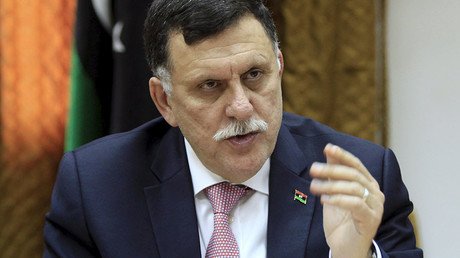World powers up for arming Libyan govt to counter ISIS
Members of the UN Security Council say they’re ready to lift an arms embargo and supply the Libyan government with weapons to combat Islamic State terrorists.
This decision is stated in an official communique of talks in Vienna, signed by all five permanent UN Security Council members (the US, Russia, France, UK and China), as well as representatives of over 15 other countries participating in the talks. It comes after Libyan Prime Minister Fayez Sarraj called for lifting arms embargo to support the national army earlier on Monday.
Just released Ministerial Meeting for #Libya Joint Communique Media Note → https://t.co/6e4fiKQoVdpic.twitter.com/gGjkNY97bd
— Department of State (@StateDept) May 16, 2016
“The Government of National Accord has voiced its intention to submit appropriate arms embargo exemption requests to the UN Libya Sanctions Committee to procure necessary lethal arms and materiel to counter UN-designated terrorist groups and to combat [Islamic State or IS, formerly ISIS] throughout the country,” the communique states.
“We will fully support these efforts while continuing to reinforce the UN arms embargo."
Libyan Premier Fayez al-Sarraj said his government is preparing to submit a weapons wish list.
“We have a major challenge ahead of us [fighting extremists],” he said, urging the international community to assist his government in combatting terrorism.
The war-torn North African nation is currently under a UN embargo imposed to keep lethal weapons away from the hands of terrorists, as well as alternate forces that seek to overthrow the UN-backed government.
It was made clear in the communique that the council members consider the Libyan Government of National Accord the only legitimate power in the country and call on all economic institutions to coordinate their work with this government. The participants in the conference also state they are ready to resume the work of their diplomatic missions in Tripoli as soon as the Libyan government ensures their security.
The signatories also urged Libya to comply with resolution 2259. Among other things, it stresses the need to build a national democratic government in Libya, which is to promote and protect human rights, protect integrity and unity of national institutions, respond to threats to Libyan security and undertake actions to defeat IS.
Meanwhile, comments have started to come from participants of the council.
"[An] arms embargo allows GNA [Government of National Accord] to request weapons when they need it, specifically to counter [IS]. If these are legitimate arms requests," US Secretary of State John Kerry told reporters after the ministerial conference, adding that while Libya’s legitimate government should not be victimized by UN decisions, the lifting of arms embargo should be “carefully sculpted.”
Paolo Gentiloni, Italian Foreign Minister co-chairing Monday’s talks, also said that assistance requests from the Libyan government will be considered.
However, German Foreign Minister Frank-Walter Steinmeier said the GNA’s activities will be limited until all sides in the power struggle come to an agreement. “This government has started working. But, of course, this government’s possibilities will be limited as long as the internal conflict and competition between the two rival forces remains,” Steinmeier said during the ministerial meeting.
Libya turned into a battleground as competing groups vied for power after former Libyan leader Moammar Gaddafi was toppled five years ago. There have been two opposing governments in the country since 2014 – the General National Congress based in the capital Tripoli and the Council of Deputies in the eastern town of Tobruk. In December of 2015, the two rival governments agreed to create a Government of National Accord in order to bring stability and peace to the country. It assumed its duties on March 31 with Prime Minister Fayez Sarraj as its head.
The goal of Monday’s meeting was to strengthen the GNA against IS, which has been expanding its presence in the Libya in the recent months, as well as to try to prevent yet another wave of refugee from heading to Europe, this time from Libya, as the previously used route from Turkey into Greece has been largely shut.













